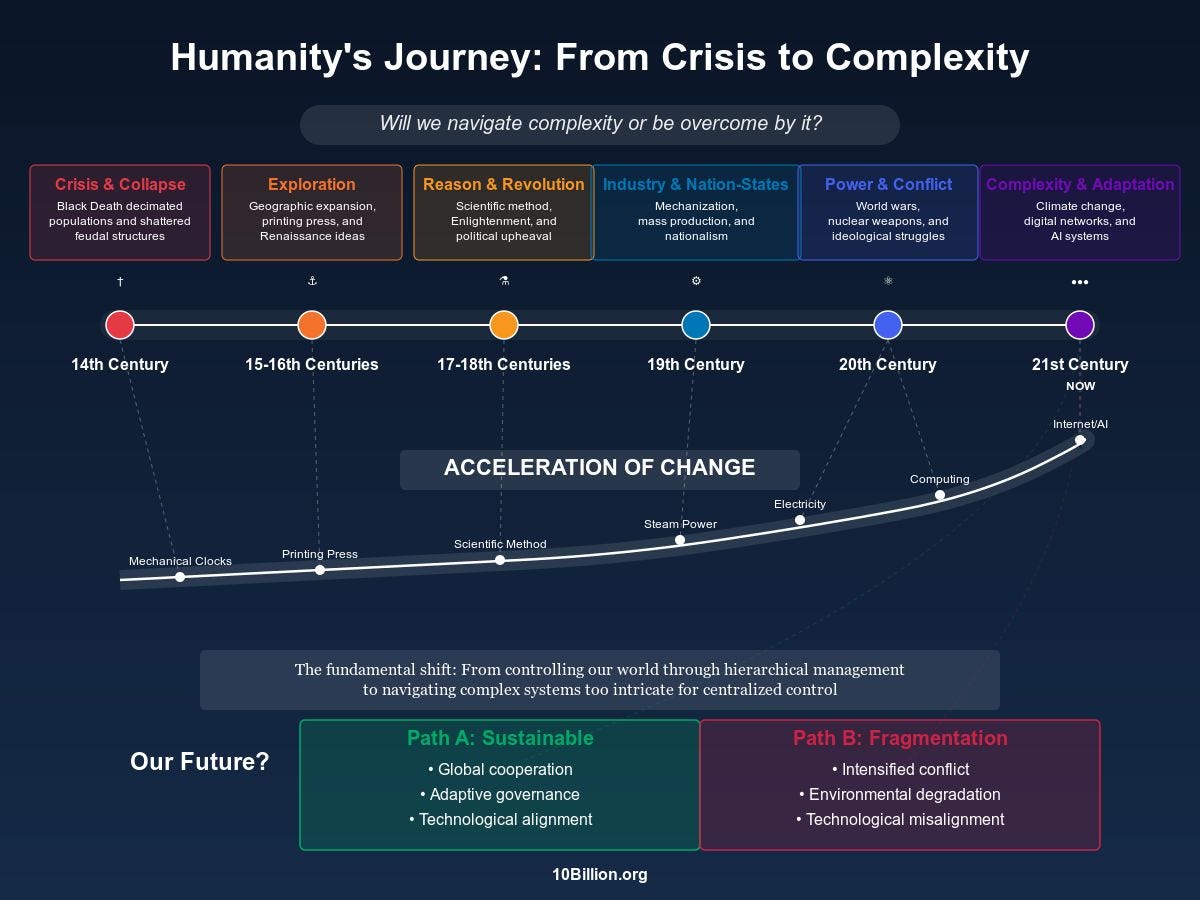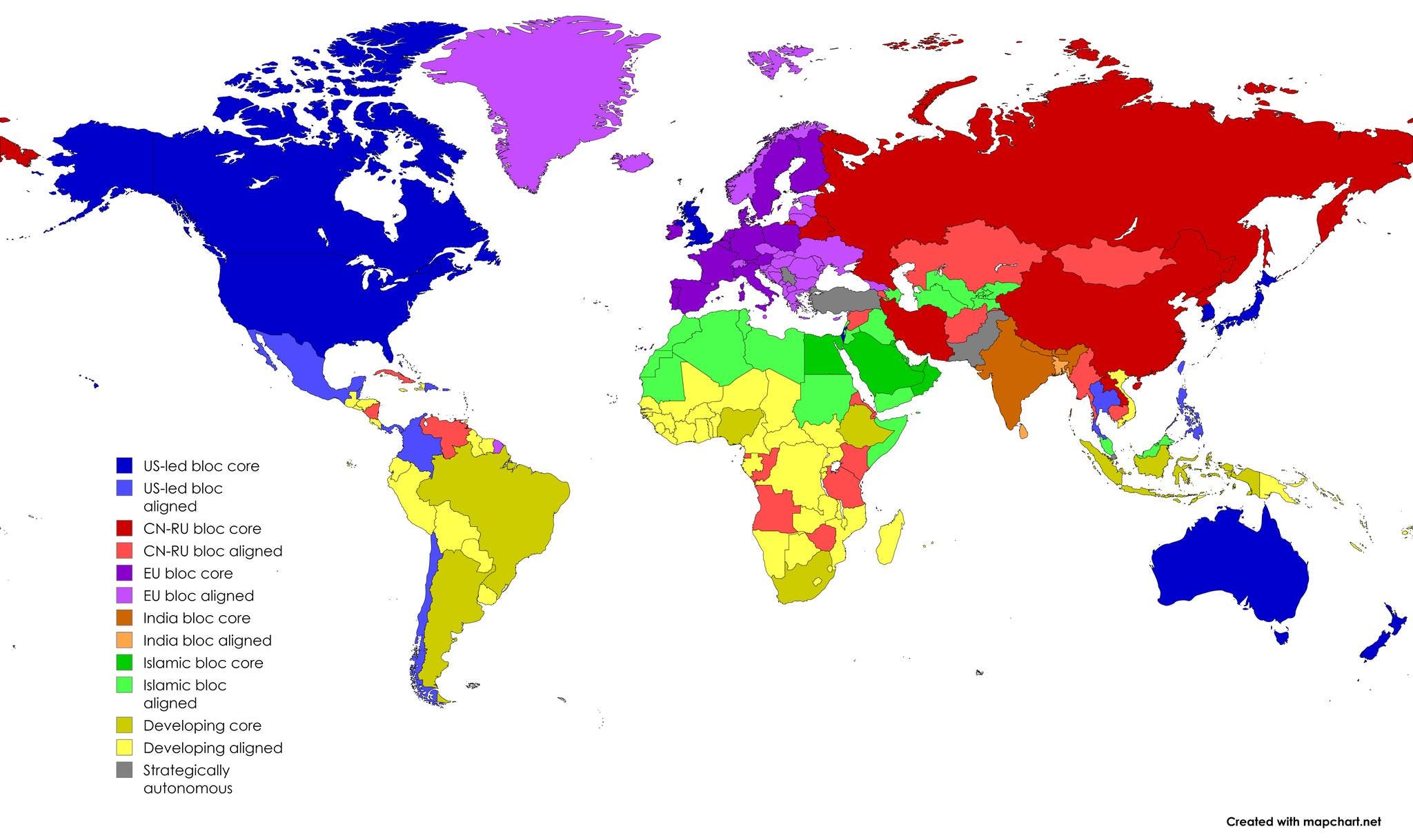The Crucible Decade: Why 2025-2035 Will Forge Humanity's Future
History's Compass for Navigating Climate, AI, and Geopolitical Convergence.
We stand at a rare and profound inflection point in the human story. This is not merely another turbulent chapter; it is a crucible decade, concentrated significantly between 2025 and 2035, where the deep currents of history meet an unprecedented convergence of accelerating, interlocking global challenges. The choices made – or irrevocably deferred – within this narrow window will likely set the trajectory of civilization for generations, perhaps centuries. The stakes are planetary.
Navigating this passage demands more than fleeting optimism or technological solutionism. It requires a clear-eyed wisdom, grounded in understanding the fundamental systems – social, political, economic, and global – that structure our existence. These are the living architectures of how we relate, govern, produce, trade, cooperate, and compete. They possess immense inertia yet are constantly evolving through feedback loops and complex interdependencies.
Looking back across millennia provides not a predictive map, but an essential compass. It reveals discernible patterns, recurring dilemmas, and the powerful forces of transformation we must now consciously engage. This historical perspective, infused with realism about power, economics, environmental limits, and human nature, is indispensable for grasping the gravity of our moment and the nature of the choices immediately before us.

I. The Long View: Lessons Etched in Millennia of Order
Humanity's journey is a vast, ongoing experiment in order-building:
Deep Foundations: For over 95% of our history, adaptable hunter-gatherer bands thrived on kinship, reciprocity, consensus, and deep ecological knowledge.
The Agrarian Revolution (c. 10,000 BCE): Agriculture unleashed surplus, cities, and specialization, but also durable inequality, hierarchy, centralized states, and organized warfare. Order scaled, becoming more complex and coercive.
Imperial Systems & Axial Thought (c. 500 BCE – 1500 CE): Empires pioneered large-scale administration, while Axial Age thinkers introduced transformative ethical frameworks emphasizing universal principles and justice.
The Modern Global System (c. 1500 – 1945): Westphalian sovereignty, Enlightenment ideals, industrial capitalism, and colonialism forged a globally interconnected, yet deeply unequal, order marked by unprecedented progress, power, and peril.
Accelerated Interdependence & Its Fractures (1945 – Present): Post-WWII institutions sought to manage interdependence, followed by rapid globalization and the digital revolution. This brought benefits but also revealed systemic fragility (financial crises, pandemics), exacerbated inequalities, fueled ecological crises, and saw a resurgence of great power competition.
A crucial historical pattern – the "Progress Paradox" – persists: major leaps in capability often create complex new problems. Agriculture brought surplus and new vulnerabilities. The printing press spread knowledge and propaganda. Industrialization created wealth and ecological devastation. Digital networks connect humanity and enable mass manipulation. Progress is double-edged; navigating its consequences requires continuous adaptation and foresight – qualities often scarce when most needed.
II. History's Rhythms: Persistent Dynamics & Transformative Forces
Certain dynamics consistently shape human affairs: the negotiation of power and hierarchy; competition over vital resources and security; the fundamental need for identity and belonging (and its dangerous shadow, exclusion); and the constant requirement for systems to achieve legitimacy beyond coercion.
These are perpetually reshaped by transformative forces:
Technological Revolutions: Fundamentally altering capabilities, economies, warfare, and social life, often outpacing governance (the Governance Gap).
Ideological & Normative Shifts: Changing worldviews and ethical frameworks that mobilize societies.
Environmental Pressures: Climate, pandemics, resource limits acting as powerful, non-negotiable constraints and selection pressures.
Demographics: Shaping labor markets, social structures, political demands, and migration patterns.
History teaches that stability is provisional. Orders contain the seeds of their own change. Crises, while perilous, often act as necessary crucibles for forging new arrangements. Adaptation is not optional; it is the price of continuity.

III. The Crucible Decade (c. 2025-2035): An Unprecedented Convergence
What makes this coming decade historically significant is the simultaneous convergence and interaction of multiple systemic crises reaching critical thresholds:

Climate Emergency – The Physical Deadline: We are hitting scientifically defined boundaries for potentially irreversible damage to Earth's stabilizing systems (ice sheets, ocean currents, biodiversity). The window to limit warming to relatively safer levels (1.5°C or even 2°C) and avert catastrophic, cascading consequences for food, water, stability, and mass displacement closes definitively within this decade. This is physics, not politics. (Source: IPCC consensus reports).
Artificial Intelligence – The Governance Watershed: AI capabilities, particularly general-purpose systems, are advancing exponentially, potentially approaching transformative Artificial Intelligence. This trajectory presents profound risks alongside potential benefits: large-scale labor disruption, unprecedented disinformation capabilities (deepfakes undermining reality), autonomous weapons proliferation, algorithmic bias reinforcing inequality, novel security threats, and the fundamental challenge of ensuring complex systems remain aligned with human values and under human control. Establishing robust safety, ethical, and governance frameworks before capabilities become unmanageably powerful or widely deployed is an urgent, time-limited imperative of historic significance.
Geopolitical Instability – Order Under Strain: The transition to a contested, less predictable multipolar world is accelerating friction between major powers (US-China, Russia-West), increasing conflict risks, undermining international cooperation precisely when it's most needed, and fostering fragmentation (trade, tech, finance). Established institutions face legitimacy and effectiveness crises.
Economic System Strain – Compounding Pressures: High global debt (historically unprecedented outside major wars), structural inequalities, persistent inflation in key sectors, the immense disruptive adjustments required by the energy transition and automation (potentially accelerated by AI), and demographic pressures create systemic fragility vulnerable to cascading shocks.
Erosion of Trust & Truth – Foundational Cracks: Demonstrable declines in public trust in institutions (governments, science, media), coupled with acute political polarization often amplified by digital platforms, cripple collective sense-making. The industrial-scale spread of sophisticated mis- and disinformation (increasingly AI-generated) severely degrades the shared information ecosystem necessary for functional democracy and coordinated action.
These crises are not additive; they are multiplicative. They interact and amplify each other. Climate stress fuels conflict. Geopolitical rivalry blocks climate action and AI safety cooperation. Economic anxiety drives polarization. AI accelerates both solutions and dangerous new threats. This intense interconnectedness creates powerful path dependencies: near-term actions (or inactions) – on climate finance, AI regulation, multilateral reform, economic policy – will disproportionately narrow future possibilities, making course correction vastly harder later.
IV. What Is Fundamentally at Stake?
The outcomes of this decisive decade directly impact the core conditions of human existence and potential:
Planetary Health & Habitability: The stability of the biosphere that sustains complex life.
Human Well-being & Security: Access to basic needs, safety from systemic shocks, and the potential for flourishing lives.
Freedom, Dignity & Agency: The balance between individual autonomy and encroaching technological, corporate, or state control, especially in an age of powerful AI.
Justice & Equity: The fairness of resource distribution and opportunity within and between societies during profound technological and ecological transitions.
Peace & Stability: The likelihood of avoiding large-scale conflict and managing potentially catastrophic risks (nuclear, AI, bio) in an increasingly complex world.
Collective Wisdom & Adaptive Capacity: Our ability to perceive reality clearly, learn, cooperate across differences, and steer our powerful technologies towards beneficial ends while mitigating existential dangers.
Ignoring the severity of this convergence courts outcomes ranging from dangerous fragmentation and instability to authoritarian consolidation or even cascading systemic breakdowns reminiscent of historical collapses.
V. History's Compass: Principles for Navigating the Crossroads
While history offers no simple blueprints, it provides a compass – principles derived from observing millennia of human successes and failures in managing complexity and change:
Acknowledge Reality & Complexity: Confront evidence unflinchingly. Embrace systems thinking to understand interconnectedness, feedback loops, and unintended consequences. Avoid simplistic narratives.
Foster Adaptability & Resilience: Cultivate institutional flexibility, societal learning, and the capacity for course correction. Rigidity in the face of fundamental shifts is perilous.
Integrate Long-Term Perspective: Evaluate decisions based on multi-generational impacts and ecological sustainability, resisting the powerful gravitational pull of short-termism.
Demand Ethical Foresight & Governance: Proactively embed ethical considerations, rigorous risk assessment, and robust safety protocols into the development and deployment of powerful new technologies (especially AI and biotech) before they become globally scaled or uncontrollable.
Strengthen Effective & Legitimate Cooperation: Revitalize or reinvent mechanisms for global and regional collaboration capable of addressing transnational threats, adapting institutions to new realities while ensuring accountability and broad participation.
Prioritize Trust & Information Integrity: Actively work to rebuild social cohesion and combat the degradation of the information ecosystem, recognizing these as foundational for any effective collective action.
Seek Inclusive & Just Solutions: Sustainable outcomes must be perceived as reasonably fair and developed with meaningful input from diverse populations, particularly the most vulnerable, ensuring transitions do not exacerbate historical inequities.
Conclusion: The Weight and Potential of Now
The 2025-2035 decade is a crucible, carrying the accumulated weight of past decisions and holding the potential to shape centuries to come. The challenges are unparalleled in their convergence, scale, speed, and potential irreversibility. But our scientific understanding, technological capabilities (including AI's potential for good), and capacity for global awareness are also unprecedented.
History warns against hubris, division, complacency, and the failure to adapt to changing realities. Yet, it also testifies to humanity’s remarkable capacity for creativity, ethical growth, and cooperative action, often catalyzed by shared awareness of necessity. We are, perhaps, the first generation to possess such a clear, data-driven understanding of the global, systemic risks we face – including those generated by our own ingenuity.
That knowledge confers a profound responsibility. It demands realism without despair, ambition tempered by humility, and cooperation built on mutual respect and a clear understanding of shared fate. It requires moving beyond the tyranny of the immediate, the comfort of tribalism, and the dangerous allure of simplistic solutions. It requires cultivating foresight, strengthening global dialogue, demanding accountability from those in power, and recognizing our profound interdependence with each other and the living planet.
The future is not predetermined, but it is being forged in the choices we make – consciously or unconsciously – right now. Let us use the compass of history, the tools of reason, and the bonds of our shared humanity to navigate wisely.
"We have Paleolithic emotions, medieval institutions, and god-like technology. And it is terrifically dangerous, and it is now approaching a point of crisis."



